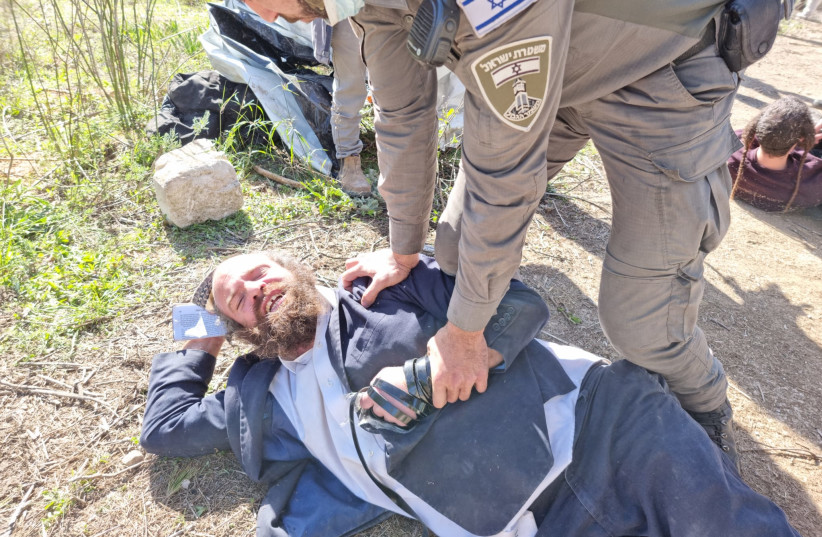Soldiers have the responsibility to stop Jewish extremist violence in the West Bank, but arrests should be carried out by police, the IDF said in the midst of a heated debate as to why Israeli civilian attackers are not arrested at the scene.
“It’s the duty of IDF soldiers – and within their authority – to act to stop violent incidents by Israeli civilians in the Judea and Samaria region, until Israel Police forces arrive on the scene,” the IDF Spokesperson’s Unit said Sunday. “IDF soldiers are expected to use this authority and not to stand by in such cases.”
It issued the statement in the midst of a heated debate between the army and the police as to who has the authority to carry out arrests of violent Israeli civilians in the West Bank.
The absence of such arrests has been evident in many high-profile attacks against left-wing activists and Palestinians in which no arrests were made at the scene.
This included stone throwing last month at Palestinian stores off of Route 60, where it traverses the town of Huwara section. Soldiers were on the road, but didn't carry out any arrests against settlers in a celebratory convoy of cars that perpetrated the attacks.

The public debate began in the Knesset Foreign Affairs and Defense Committee (FADC) and spilled over into a security cabinet meeting.
It then continued with a letter Public Security Minister Omer Bar-Lev sent to the upper echelons on the matter.
Knesset FADC chairman MK Gilad Kariv (Labor) said last month that the IDF had full responsibility to make arrests on the scene and to transfer those suspects to the Police. He insisted that they had a responsibility to do so, particularly since they were first responders and had maximal man power in the area.
Kariv asked for statistics on how many times such arrests have been made. When neither the IDF or police representative had such data, he asked that it be presented at a future meeting.
But at a subsequent security cabinet meeting during a heated exchange with Bar-Lev, IDF Chief of Staff Lt.-Gen. Aviv Kohavi denied that the army had such power, according to the Hebrew media.
Bar-Lev said that the military is responsible for the area, that the police don’t have enough manpower to handle the Judea and Samaria districts and that IDF troops can detain Israelis involved in violence until police arrive.
Kohavi then cited a document written by the attorney-general in 1998 saying said that troops had no authority to intervene and act against Israeli citizens in the West Bank.
“I’m not going to argue with you right now, but you’re just wrong. You are quoting partial and incorrect things,” Bar-Lev responded.
The Public Security minister then wrote to Defense Minister Benny Gantz to explain that Kohavi’s words were contrary to law. He provided citations from the same 1998 document, as well as a security edict from 2009 and the IDF statement to the January FADC meeting, all of which supported his contention that soldiers had the power to arrest Israeli civilians.
The letter was also sent to Prime Minister Naftali Bennett, the attorney-general, deputy attorney-general, and members of the Foreign Affairs and Defense Committee.
According to Haaretz, the Police saw Kohavi’s remarks as an attempt to shift responsibility to it for what happens in West Bank territory under military control. The report said that the Police have complained about a lack of coordination with the military as well as a lack of patrol cars and other vehicles which makes it more difficult to respond to events.
“The threshold of violence is rising – not only against Palestinians but also against security forces,” senior Central Command officers warned, as quoted by Walla News.
They referenced an incident in 2015, in which three members of the Dawabsha family were killed, including an 18-month-old baby, in the West Bank village of Duma after Jewish settlers torched their home.
“A Duma 2 incident is hovering over us – and in our estimations, this time it will not be possible to contain such a dangerous and serious incident,” they said.
The officers, who were not named, stressed that “all parties must do more to prevent the next violent incident.”
Among the more high-profile incidents of settler and/or Jewish extremist violence this year was an attack last month in which a vehicle belonging to left-wing Israeli activists was torched.
In September 2021, a four-year-old Palestinian boy was injured when settlers stoned his home in the South Hebron Hills.
Neither the army nor the Police keep public data on such attacks. According to a database from the UN Office for the Coordination of Humanitarian Affairs (OCHA) there was a 39% increase in attacks by Jewish extremists and/or settlers against Palestinians and their property in 2021; there were 497 incidents, of which 126 involved physical casualties. In 2020, there were 358 such incidents, with physical casualties in 84 of them.
